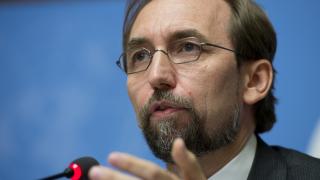
The United Nations' human rights arm has launched its most ambitious funding appeal yet in a bid to curb the "erosion" of human rights around the world. The $253 million appeal – its largest to date – aims to bolster its 2017 work programme to protect and advance the rights of people globally.
This is a welcome step towards strengthening what has been dubbed the UN's "neglected pillar", afforded only slightly more than three per cent of the total UN regular budget. As this is not enough to implement the vital human rights mandates set by the General Assembly and the Human Rights Council, 60 per cent of the budget of the Office of the High Commissioner for Human Rights (OHCHR) comes from voluntary contributions from states and other donors.
The extra funds, says OHCHR, will support the provision of in-country assistance, the work of UN independent rights experts and the Human Rights Council, and contribute to a number of trust funds on issues such as torture to the rights of indigenous peoples and modern slavery. Announcing the appeal, the UN High Commissioner for Human Rights, Zeid Ra'ad al-Hussein (pictured), said:
Our world has entered a period of profound uncertainty. In numerous countries, even the rules are under attack - xenophobia and calls for racial and religious discrimination have entered mainstream discourse and every day, seemingly, are more widespread and more deeply rooted... This is cause for grave alarm – but not dejection. It is a cry not to despair but to action.
While the appeal is a crucial springboard for OHCHR, the obstacles it faces are not only financial. At a high-level roundtable discussion in November last year, organised by UNA-UK in partnership with the Universal Rights Group, a range of experts from government, the UN, civil society and academia set out practical recommendations for reform. An outcome report will be availble on the UNA-UK website soon.
While funding was a key consideration, participants also noted the inefficiency of the Human Rights Council, as a result of its huge backlog and duplication of work. They also raised the need for better interaction between the human rights arm - which is based in Geneva - and the wider UN system, particularly the Security Council, as well as the need for more emphasis on implementation and follow-up.
The UK has a valuable role to play in revitalising the UN's human rights system. As a permanent member of the Security Council and a voting member of the Human Rights Council, the UK also has unique capacity to lead by example at the Council and to increase the focus on implementation.
For example, the UK could use its forthcoming Universal Periodic Review on 4 May - a peer-review process at the Human Rights Council which scrutinises the human rights record of every member state - to publicly follow-up on the recommendations received from the previous cycle. The UK could also work with new UN Secretary-General to improve links between OHCHR and the wider UN system.
The scale of human rights violations currently facing the international community means that it is more critical than ever – for the welfare of individuals around the world and for the future status of human rights within the overall UN institutional architecture – for the Human Rights Council to demonstrate its capacity to respond effectively.
Photo credit: UN Geneva






